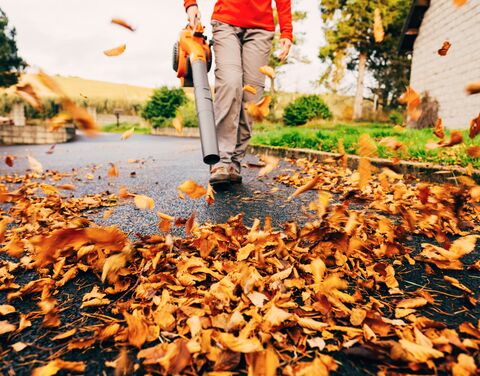
Leaf blowers, mushroom foraging, etc: Answers to legal questions that the fall brings
Do I have to tolerate the irksome noise of leaf blowers in the neighborhood? When can I forage mushrooms in the fall and how many can I pick? And can my landlord decide when to turn on the heating? Fall colors the landscape in rich, warm hues, but along with the crisp fall winds comes a whole new set of legal issues.
In the fall, a large amount of slippery leaves accumulates at the entrance of our multi-family dwelling. Who is liable if an accident happens?
The owner of the property is subject to construction owner liability: he or she is responsible for maintenance of the entrance area and must ensure that the leaves are regularly raked up so that no one can slip and fall.
In the fall, our neighbor lets his leaf blower rip every day at around 8 a.m. Is that allowed?
On work days, 8 a.m. is not during quiet hours, which means the operation of technical equipment is allowed in this case, provided the noise is not excessive. The question of whether it is excessive is at the discretion of the judge. Use of the leaf blower on Sundays is not allowed. The exact quiet and nighttime hours where you live can be found in the Police Regulations for your municipality or canton.
My neighbor claims that leaf blowers are not allowed for private use. Is that true?
No, private individuals are also allowed to keep away leaves with a blower. However, due to the noise, please note the times you can use the blower.
In the fall, my maple tree also “scatters” its leaves in the neighbor’s yard. My neighbor blows these – together with other leaves and twigs – back into my yard. Do I have to tolerate this?
Here, the question is whether the leaves are an excessive nuisance. The assessment of excessiveness can vary depending on the city and location of the property and is at the discretion of the judge. The Federal Supreme Court has held that a normal case of fallen leaves in a residential area with many single-family homes and trees is not deemed to be excessive. In short: your neighbor must tolerate the fallen leaves and is not allowed to blow the leaves back onto your property. We recommend talking with your neighbor.
Fallen leaves from our neighbor’s trees are clogging our rain gutter. Do I have to pay for it to be professionally cleaned?
Here, too, it is a question of the excessiveness of the leaves. If tedious and thus costly work is regularly required to clean the rain gutter, then[PA1] under some circumstances in an urban environment, this may be considered an excessive nuisance – and your neighbor in question would have to pay for the costs incurred.
Is there a provision regarding where I can or must dispose of fallen leaves?
You can compost the leaves in your yard or, for example, leave them under shrubs or in piles for hedgehogs, as long as it doesn’t create a risk (e.g. of slipping). It is not permitted to dispose of such leaves in the forest. If larger amounts of leaves have fallen, you can also dispose of these in organic waste or directly at your local compost facility.
As the tenant, am I responsible for removing the leaves from the sidewalk in front of my house?
City and cantonal maintenance crews are responsible for clearing public streets and paths. Owners are responsible for removing the leaves from in front of the house and from the driveway.
If you are a renter and this duty was transferred to you in your rental contract, then you must rake the leaves.
How often and how thoroughly must I remove the leaves?
You must maintain the property so that no one is injured while using the property in a normal manner. However, the law does not state how often or how thoroughly leaves must be removed. The duty is based on the actual circumstances (are the leaves dry or wet and slippery) and the principle of good sense.
The civil court with jurisdiction in the place of the accident always decides in individual cases.
What if I am not able to rake the leaves because I’m sick or on vacation, for instance?
If this duty is stipulated in your rental agreement and you are not able to do it yourself, then you must ensure that it is performed by someone else. This means you should ask a neighbor to clear the leaves for you or pay someone else to do it.
I don’t have a leaf blower, broom or rake. Does my landlord/lady have to provide one for me or do I have to buy one myself?
If your rental contract states that you are responsible for raking the leaves, then your landlord/lady is responsible for providing you with the necessary tools, i.e. a broom, rake, dustpan and bins. However, they are not required to provide a leaf blower.
A lot of leaves from our neighbor’s garden fall on our property. Can I throw them back onto their property?
No, you cannot. Leaves that fall from your neighbor’s tree onto your property are legally considered to be emissions. However, in this case the law stipulates that emissions are only intolerable if they are excessive. The Swiss Federal Supreme Court considers leaves in fall to be a naturally occurring phenomenon. Since leaves do not fall all year round, but only during a limited time during fall, such emissions are not excessive and thus must be tolerated.
Whether there is an excessive emission in a specific case cannot be judged based on your own personal feelings, but rather based on how the average citizen would react to this. And criteria such as the location and condition of the property play a role in the question of excessive emissions. If there are no special circumstances, such as a tree that loses its leaves year round, then you are required to rake up leaves that fall from your neighbor’s tree onto your property. And this green waste may not simply be thrown back onto your neighbor’s property.
You can pick and keep apples that protrude from your neighbor’s tree onto your property.
Several branches of an apple tree protrude from my neighbor’s property onto my property. Can I keep the fallen fruit?
Yes. You can even pick and keep the apples that extend from your neighbor’s tree onto your property. In Switzerland this falls under “Anriesrecht”, the right to pick fruit that extends onto your property.
My family and I like to pick mushrooms. Can we gather as much as we’d like?
The rules governing the picking of mushrooms vary from canton to canton. In some cantons, there is a closed period (e.g. from the 1st to the 10th of every month or at night). And depending on the canton, there may also be a quantity limit per person and day. This is normally two kilograms. Organized and commercial picking is prohibited in most cantons.
Please note that nature reserves and plant conservation areas are generally off limits for picking mushrooms.
My apartment starts to get cold with the onset of the fall season. My landlady refuses to turn on the heating before November. Can she do that?
No, a blanket refusal is not allowed. During the day, an average room temperature of 20 degrees Celsius must be achievable in the apartment, otherwise this is considered to be a defect. If it is colder than this temperature in the apartment, then you can notify your landlord and demand that she turn on the heating – or repair it if it is defective.
A driver ruined my expensive trench coat by speeding through a puddle and splashing me with the dirty water. Does the driver have to pay for the cleaning costs or even reimburse me for a new coat?
In general, drivers are liable for the damages they cause or caused by their vehicles. The question here is whether the property damage caused to the coat in this case by the splashed water can be included in the category of the normal risks of driving. The driver could counter that the puddle is due to force majeure, i.e. was caused by the weather.
The basic principle in road traffic is: the driver must always adapt his/her speed to the conditions. However, there is no duty for drivers to drive at walking pace when it rains or if there are puddles on the road.
In Switzerland, there has not yet been a ruling on “damages from puddle water”. In Germany, on the other hand, a “sprayed” couple sued a liability insurance for cleaning costs of EUR 39.60. The case was dismissed, however, because traffic would come to a halt in bad weather if drivers had to drive at walking pace to adapt to the weather conditions.
There is no winter tire obligation in Switzerland. However, as a car owner or driver you are obligated to ensure that your vehicle is safe to operate.
Do I have to have my winter tires changed by a certain time?
There is no winter tire obligation in Switzerland. However, car owners or drivers are obligated to ensure that their vehicle is safe to operate. If you drive your car with summer tires in the winter and cause an accident because of the lack of tire traction, you can expect to receive a heavy fine and have your driver’s license suspended.
What happens if I drive the entire winter with summer tires? Can I be fined?
Since there is no obligation to have winter tires, it is not prohibited per se to drive with summer tires in the winter. Nevertheless, you should be sure to have suitable tires. First, the official sanctions are strict. And second, your insurance could decrease benefits if you cause an accident while driving with summer tires in winter conditions.
You can find more information on this topic in our article "Changing your tires".
I park my car outdoors. Do I have to scrape the ice off all the windows every morning in the winter?
The driver has to have a 180-degree view ahead. In short: The front windshield and the front side windows have to be completely free of ice. However, we recommend deicing all windows for road safety reasons.
You can find more information about this topic in our "Peephole" blog article.
The steps to our apartment building are often covered in snow in the winter. I’m not very steady on my feet, so this makes it difficult for me. Are there rules on how often the caretaker has to clear the snow?
There are no explicit legal regulations on this. Generally, the property owner is responsible for clearing snow – and as a construction owner is obligated to ensure the safe use of their property.
However, as a rule, the obligation to clear snow only applies during times when there is pedestrian traffic (between 7 am and 9 pm). Pedestrians are also expected to adapt to the weather conditions and take care when there is snow or black ice.
A tenant is only responsible for clearing snow when this is explicitly stipulated in the tenancy agreement. The situation is different in the case of single-family houses and parking spaces. Here, the tenant is responsible for clearing snow.
If you slip outside the building because the snow has not been cleared properly, it must be ascertained whether the property owner can be held liable for the damage. In the event of a dispute, a judge will decide.
We live in a hamlet in the Zurich Oberland. When it snows overnight, I can't get to work on time in the morning. My boss is unhappy with me arriving late. Do I have to make up for the missed work time?
Yes, you have to make up for the missed work time. Employers only have to continue paying the salary in cases of incapacity to work through no fault of the employee if the reasons for this concern the employee personally. Examples include if the employee is ill, has had an accident or is fulfilling legal obligations.
If you are late due to snow, a cancelled train or a similar reason, you must bear the risk and make up the time. If snow is forecast, you should therefore plan delays into your journey and set off earlier to get to work on time.








